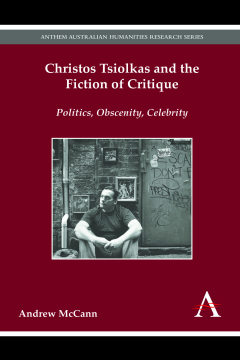
Additional Information
Book Details
Abstract
Christos Tsiolkas is one of the most recognizable and internationally successful literary novelists working in Australia today. He is also one of the country’s most politically engaged writers. These terms – recognition, commercial success, political engagement – suggest a relationship to forms of public discourse that belies the extremely confronting nature of much of Tsiolkas’s fiction and his deliberate attempt to cultivate a literary persona oriented to notions of blasphemy, obscenity and what could broadly be called a pornographic sensibility. ‘Christos Tsiolkas and the Fiction of Critique’ traces these contradictions against Tsiolkas’s acute sense of the waning of working-class identity, and reads his work as a sustained examination of the ways in which literature might express an opposition to capitalist modernity.
Christos Tsiolkas is one of the most recognizable and internationally successful literary novelists working in Australia today. He is also one of the country’s most politically engaged writers. These terms – recognition, commercial success, political engagement – suggest a relationship to forms of public discourse that belies the extremely confronting nature of much of Tsiolkas’s fiction and his deliberate attempt to cultivate a literary persona oriented to notions of blasphemy, obscenity and what could broadly be called a pornographic sensibility.
Andrew McCann is a professor in the Department of English at Dartmouth College, New Hampshire.
‘McCann deftly situates Tsiolkas in both his vernacular local context as well as defining the contradictory elements of his growing global appeal. Tsiolkas’s extreme fictions are rendered legible as much through references to Pasolini’s legacy of queer aesthetics as to Adorno’s critiques of mass culture. At the same time McCann delivers an incisive and breathtakingly well-informed assessment of the current state of cultural politics in Australia.’ —Sneja Gunew, University of British Columbia
‘McCann deftly situates Tsiolkas in both his vernacular local context as well as defining the contradictory elements of his growing global appeal. Tsiolkas’s extreme fictions are rendered legible as much through references to Pasolini’s legacy of queer aesthetics as to Adorno’s critiques of mass culture. At the same time McCann delivers an incisive and breathtakingly well-informed assessment of the current state of cultural politics in Australia.’ —Sneja Gunew, University of British Columbia
Table of Contents
| Section Title | Page | Action | Price |
|---|---|---|---|
| Cover | Cover | ||
| Christos Tsiolkas and the Fiction of Critique | i | ||
| CONTENTS | v | ||
| Acknowledgements\r | vii | ||
| Preface\r | ix | ||
| Introduction. Pasolini’s Ashes\r | 1 | ||
| 1. The Down-Curve of Capital: Loaded | 21 | ||
| 2. Inside the Machine: From Loaded to The Jesus Man | 41 | ||
| 3. The Pornographic Logic of Global Capitalism: Dead Europe | 63 | ||
| 4. In the Suburbs of World Literature: From Dead Europe to The Slap | 85 | ||
| 5. The Politics of the Bestseller: The Slap and Barracuda | 111 | ||
| Conclusion. Aesthetic Autonomy and the Politics of Fiction | 133 | ||
| Notes | 139 | ||
| Bibliography | 151 | ||
| Index | 157 |
